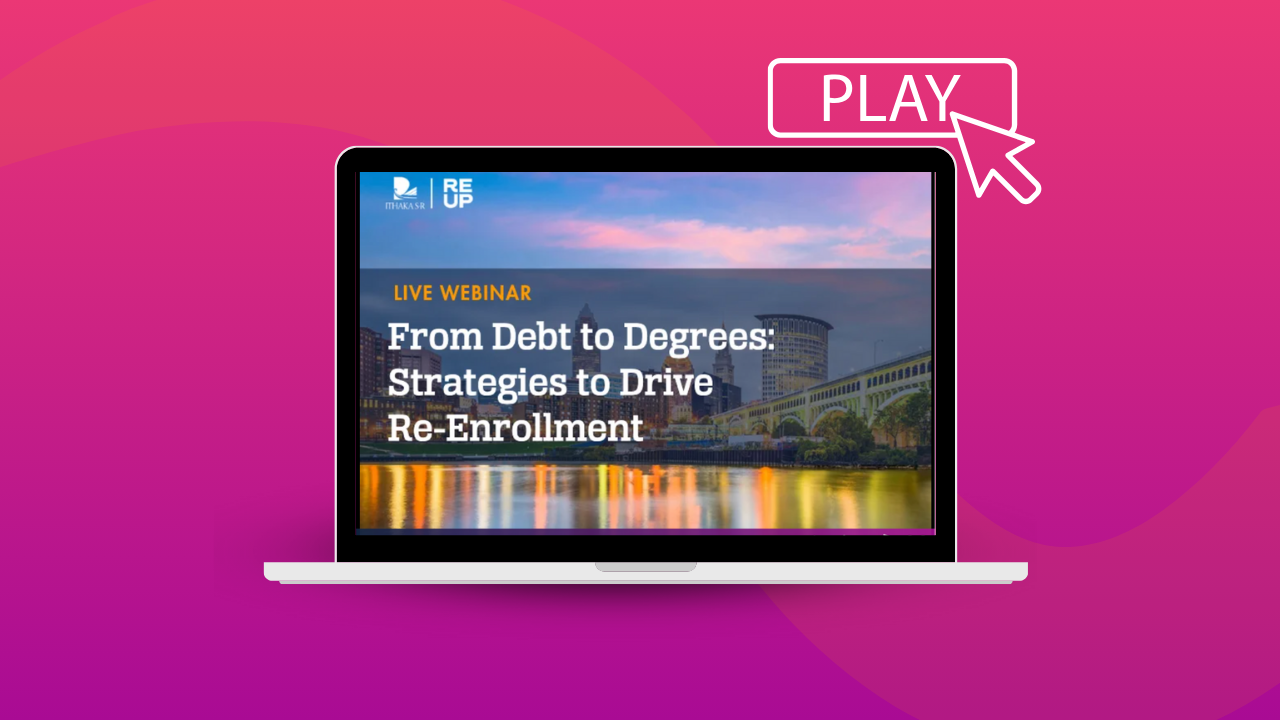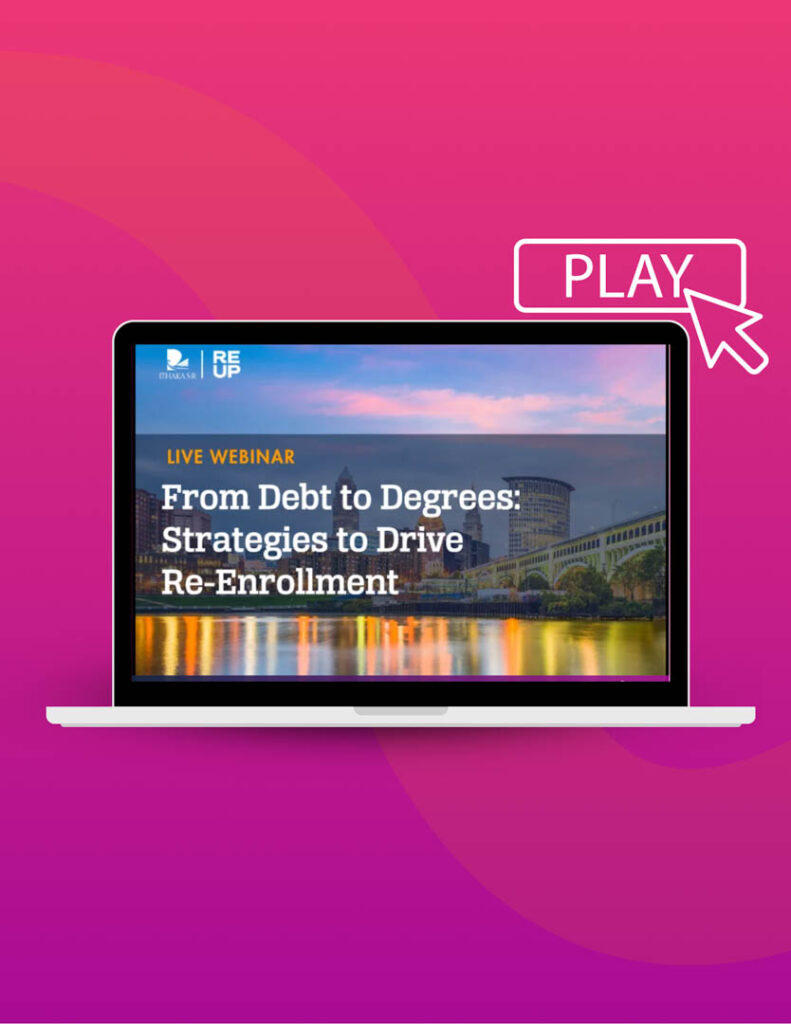Webinar Recap; From Debt to Degrees: Strategies to Drive Re-Enrollment

Debt forgiveness can change the educational journeys of SCNC learners, breaking down financial and emotional barriers that hinder their return.
For our recent webinar, “From Debt to Degrees: Strategies to Drive Re-Enrollment,” Ben Shoemaker, Director of University Partnerships for ReUp, joined Brittany Pearce, Senior Program Manager for Ithaka S+R, to discuss the success of the Ohio College Comeback Compact. This collaborative initiative offers debt forgiveness for adult learners in Northeast Ohio as a strategy to re-engage and re-enroll adult learners with some college, no credential (SCNC).
In this blog post, we share key takeaways offered during the webinar by our experts, including panelists Eunice Cabrera Francism, Project Manager, Retention at Cuyahoga Community College; Melanie Carr, Manager of Advising and Gateway Student Services at Stark State College; and Dave Marsteller, Assistant Director, Adult Focus at University of Akron.
For a closer look at the insights, best practices, and actionable strategies shared during this conversation, you can watch the full webinar here.
What is the Ohio College Comeback Compact?
Although there are over 40 million SCNC learners in the U.S., fewer than 3% re-enroll without intervention each year. For these learners, barriers like institutional debt ($15 billion nationwide) make returning to college seem impossible. The impact goes beyond the individual learners themselves, positively affecting institutions’ enrollment numbers and state economies.
Ithaka S+R, a nonprofit research and consulting organization, creates data-driven, equity-focused solutions for adult learners. The goal of the Ohio College Comeback Compact, which includes eight higher education institutions in Northeast Ohio, is to re-engage SCNC learners by eliminating administrative holds, resolving institutional debt up to $5,000, and centralizing outreach and advising efforts.
After piloting this initiative in 2022, Ithaka S+R partnered with ReUp Education in year two to scale the program further. ReUp brought its expertise in tailored outreach, learner engagement, and success coaching to complement Ithaka’s research-based approach, allowing the initiative to expand its reach and support even more returning learners.
Benefits of debt forgiveness for adult learners
Debt forgiveness can change the educational journeys of SCNC learners, removing financial and emotional barriers that hinder their return. Below are the key ways debt forgiveness supports learners, strengthens institutions, and advances equity.
Debt is a significant burden that often deters adult learners from re-enrolling in college. The reduction in both financial strain and stigma associated with debt can be life-changing.
“Where is that money going to come from? It doesn’t exist for many learners burdened with institutional debt, and that becomes their greatest barrier.”
— Dave Marsteller
Assistant Director, Adult Focus at University of Akron
Providing debt forgiveness sends a message of second chances, encouraging learners to see re-enrollment as a real possibility. It fosters optimism and a renewed sense of agency.
“Potential returners are balancing so much … They are so relieved that this debt will be removed. It’s not only removing financial barriers, it’s also giving them hope. This is a second chance to complete academic goals.”
— Eunice Cabrera Francism
Project Manager, Retention at Cuyahoga Community College
Debt forgiveness helps adult learners return to complete their credentials. This increased enrollment benefits colleges financially, as the tuition revenue from returning learners often far exceeds what schools could have collected from outstanding debt.
Learners from underrepresented and underserved communities benefit most from debt forgiveness, fostering equity and aligning with workforce demands for credentialed professionals.
rograms that include debt forgiveness demonstrate to learners that the institution prioritizes their success, helping rebuild trust and strengthening relationships.
How to support debt forgiveness at the institutional level
What can your institution do to get started with debt forgiveness to boost adult learner re-enrollment? You don’t have to be part of a compact to get started. The webinar offered four practical approaches to re-engage learners and revive their educational journeys.
1. Start by asking the right questions
Every institution should begin by examining internal policies and asking tough questions about how they serve their SCNC learners. Are systems unintentionally creating barriers? Are administrative holds or unpaid debts stopping learners from coming back?
Successful strategies often involve partnerships with state agencies, nonprofit organizations, and institutional leaders to tackle complex issues like stranded credits and debt forgiveness. The key is a willingness to question existing processes and embrace innovation.
2. Align resources with impact
While resources are often limited, the webinar panel emphasized that institutions don’t need to overhaul everything to see progress. Focus on targeted outreach, centralized advising, and scalable coaching solutions to maximize impact.
3. Reach adult learners where they are
Building awareness and engagement requires meeting learners on their terms. Use email, text messages, social media, and direct phone calls to create meaningful connections.
Personalized outreach is crucial, and ReUp’s patented Personas model offers a blueprint. With 2,500 unique personas designed to guide communication strategies, institutions can tailor their messaging to individual learners, resulting in improved response rates and re-enrollments.
4. Provide comprehensive support
Returning adult learners face unique challenges, such as financial constraints, caregiving responsibilities, and self-doubt. Institutions must go beyond academics to offer holistic support, such as flexible class schedules, financial counseling, and one-on-one coaching.
When learners feel understood and supported, they’re more likely to persist and succeed. The webinar stressed the importance of building both confidence and community among returning learners.
Watch the webinar on demand
Curious about the role your institution can play in re-engaging SCNC learners? Watch the full recording of “From Debt to Degrees: Strategies to Drive Re-Enrollment.” You’ll hear directly from experts, uncover practical tips your institution can adopt, and see how the Ohio College Comeback Compact achieved measurable results.
Let’s start the conversation
Schedule a call with a ReUp team member to learn more about what a ReUp partnership could do for your institution.
